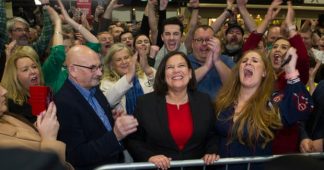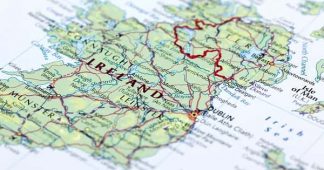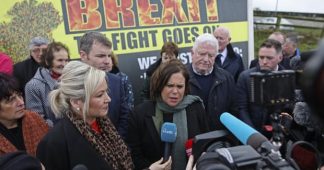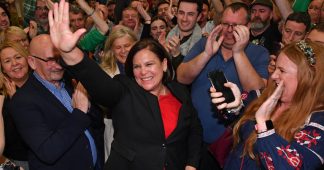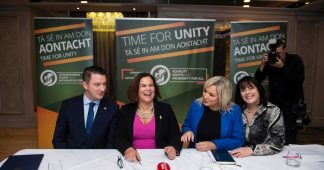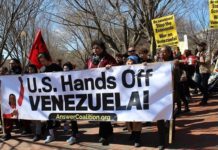by , February 28, 2020
Paul Murphy was elected to the Irish parliament in the general election of 8 February 2020. He stood as a member of RISE – Radical Internationalist Socialist Environmentalist which was part of the Solidarity-People Before Profit (SPBP) electoral coalition. [1]
Murphy was elected to the 33rd Dáil (Parliament, since independence) as TD (Teachta Dála – member of parliament) for the Dublin South-West constituency. [2] John Meehan spoke to him in Dáil Éireann on 19 February 2020.
_ _
John Meehan: Dan Finn says the Irish general election result “bucked” the European Trend. Irish voters swung to the left. Since its foundation in 1921 the Irish state has alternated between right-wing governments controlled by either Fine Gael (FG) or Fianna Fáil (FF). [3] This domination has started to break down since the 1990s. The 2020 general election produced a result which never happened before – the combined FF and FG vote fell below 50% to a total of 43.1%. What is your take on that?
Paul Murphy: You can’t avoid the conclusion that this was an historic election in terms of the decline of the two traditional establishment parties FF and FG, which together won 43% of the total vote. Not that many decades ago these parties got 80% plus of the total vote in Irish general elections. At times they got over 90%. They dominated politics in Ireland. It is the second worst ever result for FF – the only worse one being the 2011 result – the aftermath of that party’s responsibility for the crisis caused by the 2008 crash and bank bailout. It is the third worst ever result ever for Fine Gael, and they come at the same time. In the past when FF had a bad result FG had a good result, and vice versa. So it is very significant. Fundamentally there is long-term decline of the vote share obtained by both Fine Gael and Fianna Fáil. That process was dramatically accelerated by the 2008 crisis, the 2011 general election result, and the Labour Party was punished in the 2016 general election after serving in a coalition government with Fine Gael.
The 2020 result is a continuation and deepening of that trend. These results are rooted in the 2008 crisis and the response of the capitalist establishment in Ireland. Since 2016 FG has been in government supported by FF in a “confidence and supply” arrangement The two parties have consistently supported policies that favour the bankholders, the bondholders and big business. That ate away at the traditional working support these parties used to have. In an electoral sense, this has now been filled by a rise in support for Sinn Féin. There’s no question that the voters for Sinn Féin are looking to the left. The rate of transfer from SF proves this. A huge percentage of SF voters went on to vote for parties of the radical and socialist left. This indicates that the SF vote was overwhelmingly a vote to end the cycle of FF and FG rule and have radical change of a leftward character. That is what the majority of that SF vote expressed.
JM: That is very clear. The result of the election has produced considerable uncertainty. Referring back to what you said about previous backwards and forwards FG and FF governments – one feature is very obvious. The smaller parties which won rising electoral support, and entered coalition with FF or FG, were destroyed in following elections. In the recent past that has included the Labour Party which got its highest ever support in the 2011 General Election – nearly 20 per cent – but in 2020 got its lowest ever share, 4.4%, and 6 TD’s. By contrast the Radical Left Bloc won 2.8% of the total vote and gained 5 seats. In other words, it is on the same level as the Labour Party.
SF got a left-wing mandate. The official party position is that it prefers a left-wing government – which can only happen with the support of the SPBP Bloc, the Green Party, the Labour Party, the Social Democrats, and a few other left deputies. That combination cannot achieve a majority government.
FF and FG are reluctant to go into government together, but this may happen. The Green Party may go in with them. To complete the picture there are 16 other TD’s whose politics are right-wing. We do not know yet what the result of this will be.
There is a clear difference between the government policies of SPBP and SF. Can you elaborate on that?
PM: SPBP will vote for a Sinn Féin left government. It will not vote for any government that includes the right. Coalition with the right-wing parties in Irish politics has always been a graveyard for parties that receives support on a leftward basis – again, and again, and again. The 2020 SF vote is compared with the Labour Party “Spring Tide” of 1992. A large left vote was used by Labour Leader Dick Spring to enter coalition with Fianna Fáil, then Fine Gael, and the party was hammered in the 1997 General Election. The Labour rise and fall between 2011 and 2020 was even more dramatic. We also have the experience of the Green Party in government from 2007 to 2011. The party won 6 Dáil seats in 2007, and lost all its TD’s in 2011.
So, this has happened very regularly. Parties go in with a mandate for change. FF and FG represent the interests of the capitalist class in this country and block any sort of change that impacts in a substantial way their profits, and their right to maximise their profits. So, for us on the left, that has always been a red-line issue. You can not form a government with FF or FG. Such a government will not deliver for ordinary people.
That was a very a strong point in our election campaign. The headline in our leaflets was that we “the only party that will not prop up FF or FG”. That challenged very strongly, fitting in with the mood of many voters. It was an election not primarily about policy – though policy featured – it was primarily about trying to kick out the establishment parties. RISE and PBP repeatedly placed demands on SF to rule out coalition with FF and FG. SF did not do so. That helped to establish a reason for people to vote for the socialist left – we were the only ones who would definitely not put FF or FG back into power.
Post-election, all of the predicted coalition options – for example speculation about FF + Greens + Social Democrats winning a majority – they are all wildly off a majority. Even FF and FG combined do not have a majority. We have again placed a demand on SF to rule out a coalition with FF or FG. They have failed to do that – that’s their right, but we are disappointed with that response. We are not surprised! SF publicly says its preferred option is some sort of left government.
Eoin Ó Broin TD, a member of Sinn Féin’s negotiating team, elaborated: “while Sinn Féin’s preference was a left-wing coalition with the Social Democrats or the Green party the numbers are not there and that became clear on Tuesday after the General Election results.” “On Tuesday morning the broad progressive left had 66 TDs and that is not enough for government,” he said. “What we have been saying since then is we want a government led by progressive left policies.” Mr Ó Broin said now the only responsible thing to do is to sit down and talk and resolve issues with the other parties and “try to deliver government of real change”. He said Sinn Féin is “interested in speaking to all parties, including Fine Gael and Fianna Fáil”. [4]
We want to create the maximum pressure possible on SF not to look to its right – not to go into coalition with FF or FG. Instead we want to fight for a left-wing government. Fundamentally from our point of view a left government would adopt socialist policies taking on the Big Polluters, the Big Landlords, bring core parts of the economy into public ownership. That is what’s necessary to create the change that we want.
Given the current parliamentary arithmetic we argue for – in discussions with SF, the Greens, the Social Democrats – to all of them we say – rule out coalition with FF and FG. SF should seek to lead an alternative minority government. We set out how that could happen. The numbers would require FF or FG to abstain on the vote for taoiseach. Pressure can be created on them to do that. A big part of the rhetoric used by the right-wing parties after the election is “the left won the election – now they have to govern. Let’s see how they get on with their socialist policies”. We say to them “OK. Allow an alternative government without FF or FG to come to power”. Such a government would not have a majority. We say to SF is that such a government could and should immediately introduce a series of radical and popular reforms. For example, reduce the pension age to return to 65 – which was a huge issue in the election campaign. Introduce an immediate rent freeze. Increase the minimum wage. Immediately introduce popular policies, mobilise people on the streets, build movements in favour of these policies, and defy the right-wing parties to block those policies. That would create the potential to win some important reforms. We do not have illusions that would be a long-lasting government. I find it hard to believe that FF or FG would allow such a government to pass a budget of radical reforms. Such a government could be brought down by the right wing parties. Forcing another general election. We have said to SF and others that an election called in those circumstances – where you have people mobilising for change – opens the chance of creating a Dáil majority for a left government. That way, you can push the situation forward.
JM: Let’s wait and see if that happens. It is unlikely, but I can see it is a good approach. There are other possibilities.
The various right-wing forces could combine to form a government. They have a majority to do that in the Dáil, if they want.
A final possibility is paralysis and a new general election.
Here is a different problem: isn’t there a contradiction between the SPBP call on SF to form a left led government in Dublin, when SF participates in a rightwing coalition in Belfast? SF does the equivalent of a coalition with FF and FG in Stormont, where it is in coalition with right wing parties such as the Democratic Unionist Party (DUP)? Isn’t that a massive contradiction?
PM: Yes. From my point of view there is a contradiction in the nature of SF’s support. People vote for SF because, in an electoral sense, they fill a space occupied by new left formations in other countries – people see them as a reformist party which will improve people’s lives. Unfortunately, in the South there is not a strong awareness about the reality of SF’s role in the North. In general there is an attitude that things are different in the North. SF spin it very well. “It is a Tory Government, we do what we can,” etc. They wash their hands of responsibility – which is rightfully theirs. So, there is a contradiction. It is a living contradiction within SF’s support base. We want to engage with that contradiction. We emphasise the character of SF’s vote. What kind of change do SF voters want to see? We are in line with that. We want to deliver – the left should be the foremost fighters for a left socialist government.
For the moment the emphasis is on calling on SF to look to its left and form an alternative minority government. We spoke to SF today. They were very open. They are pursuing two options. One is an alternative minority government, that we agree with. The other is what they describe as a “left led coalition” – which they mean is a government of SF and the Greens plus FF. We made it very clear to them that such a government would not deliver the sort of change the people want to see. SF going into such a coalition would rightfully be seen as a betrayal of the vote for change that people have made. I made it very clear to them today we would not have anything to do with such a government. We would be vociferous opponents of such a government.
JM: The SPBP Bloc would vote against such a government?
PM: Yes. We will vote against any government which involves FF or FG. If Mary Lou McDonald is nominated for taoiseach as part of a bloc with FF or FG, we will vote against her.
JM: Can we be clear on this? This is not in other words a tactical issue? It is an issue of principle for the SPBP Bloc?
PM: Absolutely, Yes. It is non-negotiable.
JM: That particular formula removes the contradiction between the party’s government policy in Dublin and Belfast…
PM: Yes – the same thing.
Personally, I think two things would happen if SF pursue that road. One is negative. A sense of demoralisation would take over people who thought they had voted for change – but, once again, their vote for change was used to put in the same old parties.
The other thing that would happen is a vindication of the approach adopted by the socialist left. Especially if we are seen to have done everything possible to bring about an alternative government excluding FF and FG. That SF let people down. That would be quite a moment in terms of developing left politics.
In relation to the other governmental option – the FF + FG option – That is a real possibility. I think that such a government would be immediately met with working class anger, and potentially a mobilisation against it. There is a sense that when FF + FG have suffered their worst ever general election results, if they operate is such a blatant way to block change people voted for, their government will be very weak. It might not last very long. It could prepare the way for a majority left government.
JM: I have discussed this with various people who voted for SF, but who are not far away the SPBP policy.
Let’s say FF and FG form a government, supported by 16 independent rightwing deputies, maybe also the Greens. Partly as a joke I suggested that the Kerry TD Michael Healy-Rae could be rewarded with a Cabinet Post as Minister for Culture. The person I spoke to is very active in the Arts Community Sector. You could have Peadar Tóibín (ex SF, anti-abortion) made junior minister for Health.
First there was laughter, then a realisation dawned we would have to do an awful lot more more to build an active grass-roots movement on the left to challenge such a government. There is a problem here for SPBP. It has had a relatively successful general election campaign. But there are 3 component parts which are all adopting the same policy at the moment. That is at the level of the Dáil. On the ground we do not have that.
What positive things can be done by RISE to try to resolve that problem?
PM: Relatively speaking, the socialist left had a good election. But our vote is down nationally: 2.6% compared to 3.9% and we lost one seat. That was in the context of the biggest vote ever for forces perceived to be on the left. In many senses the 2020 election felt like we picked up where the 2016 result left off – one crucial fact was different, decisive for the socialist left. We had been at the high point of a massive social movement, which involved a majority of the population in Ireland, non-payment of water charges, which involved hundreds of thousands of people on the streets. We were not quite at the high point of that movement, but still it was a factor. Now you do not have those active movements. The left could have presented a more unified message.
JM: If we have a right-wing government that has a Dáil majority, the radical left will have to offer something to people at an extra-parliamentary level. It might not seem obvious at the moment, but the radical left will be competing with forces to its right. I think there will be a convergence between the Labour Party and the Social Democrats, perhaps an organisational merger will occur. These two parties will stay out of a new rightwing government; and state their support for a number of progressive campaigns. The radical left will need a unitary approach towards those forces. It will also have to appeal to people who voted for SF.
The SPBP brand seems to have appealed to many people….
PM: That is true. It will be necessary to build social movements around the issues which were important in this general election campaign. For example, restoring the pension age to 65, which became a huge issue. There is potential to organise major street protests with the backing of trade unions and political parties. Negotiations on government formation are likely to continue for at least six weeks. A big national demonstration could take place within that timeframe. It could have a material impact on the outcome of those talks. It would be an example of people power. Similarly, in terms of housing and health. Particularly if we have an FF-FG Government, we should say to people that such an administration can be beaten. Just like we won on water charges, marriage equality, and repeal of the constitutional abortion ban. [5]
We should have an orientation to building protest movements which can achieve something. It is not just about achieving isolated victories, defensive victories, in the here and now – it is also about preparing to fight for a left government in the future. As part of that, there is a desperate need for a mass party of the left. The existing forces who are part of the radical left learning to work together is an important part of that. On its own that will not constitute the kind of party that we need. Some of those forces, to bring such a party about, are the kind of people involved in the movement for repeal [of the ban on abortion], people involved in the water charges movement, those people can become politically engaged again. Building a political force linked to those forces is an important part of building the kind of left that we need.
JM: I am putting a tricky question on the table. I noticed on the campaign that priorities at the forefront of people’s consciousness were housing, health, pensions, and climate change. Brexit and the North did not feature. A Fine Gael Minister, Heather Humphries, was challenged on this. I give her credit for saying these issues were not at the top of most people’s agenda – but that does not mean they can be avoided. It was a “can kicked down the road” when the Irish Government and EU Negotiator Michel Barnier got an agreement with Boris Johnson’s British Government that the North and South of Ireland, both sides of the border, would continue to be ruled in accordance with existing EU Regulations. A new Irish Sea border will operate between the island of Britain and the island of Ireland, once Brexit kicks in at the end of 2020.
RTÉ Brussels correspondent Tony Connelly has put a lot of material on the public record credibly exploring this issue. [6]
It is clear that a “hard Brexit” disrupting this deal would cause a major crisis for the Northern Ireland State. Boris Johnson’s government is trying to dump its promise to install an Irish Sea Brexit Border.
The Irish radical reft has a significant policy problem here. There is time to resolve it. What is the mechanism for the Irish radical left to resolve this problem? I put it to you that “it ain’t going to go away”.
PM: I agree. Johnson’s Brexit deal was wildly oversold in Britain, and also by the Irish establishment, that was committed to it. The content of the deal only gets us to the end of December 2020. All these questions are going to re-emerge in a very serious way. There are no guarantees about the solutions contained in the Withdrawal Agreement, which are more than imperfect. The Agreement has huge flaws. There are real problems about a hardened border East-West, but also the potential at a later stage for hardening the North-South Border in Ireland. That is, even in terms of the current Withdrawal Agreement. And all of that can be thrown out of the window, again, by the Johnson Government in the run-up to December. Undoubtedly Brexit will emerge as an issue again.
I will say two things about that. One is that the establishment parties will seek to use it again as an argument for “stability”. Stick with what you know, because you need people like FF and FG at the helm to be able to deal with these situations. We should reject that. They failed to come up with a particularly good deal the last time around, and we should critique that. Secondly, in terms of the position that we adopt, there is a fundamental problem with all of these negotiations – there are no representatives of ordinary working-class people at either side of the negotiating table. On the one hand you have representatives of a sectional interest of a section of British capitalism negotiating with the European Commission, supposedly on behalf of the European Council, on the other. The European Commission fundamentally representing the interests of different parts of European capitalism – so we do not trust either of those sides.
Instead the interests of ordinary people should come first. What does that look like? One, a bottom line is that working-class people must not pay the price for a Tory Brexit. We do not have much influence – let’s be honest – on the negotiations as they play out. There is a question about organisations outside those negotiations, to ensure that working class people do not pay the price. The idea of common action by working people, trade unionists, etc, across this island – but also workers in Britain – needs to be promoted. For example, the Irish employers’ organisation IBEC came straight out the door and used the excuse of Brexit to oppose a raise in the minimum wage. None of that. We reject the idea of “A Race to the Bottom”. We are opposed to any redundancies. On the economic questions we keep to that line – we fight against any attempt to put the burden on ordinary workers. On the question of borders – we have to fight against any hardening of borders which is against the interests of ordinary people.
JM: You may not agree with this. I think the British and Irish ruling classes realised they would experience a serious crisis if a hard Brexit occurred in 2019. The Johnson government looked at it and accepted that EU Regulations would continue to operate North and South of the Irish Border – which kicked the problem down the road to the end of December 2020. That also kicked the problem down the road for the Irish radical left, to be ruthlessly honest about it. Now – and this is a characteristic of the Johnson Government – after making the agreement Boris is trying to undo it as quickly as possible. He cannot be trusted. After the December 2019 British election the Johnson government realised that its Brexit deal on Ireland created a long-term problem for them. The other side of it in Ireland is that most people were unaware of this in the South, but the opposite was true in the North.
For the first time in my living memory, a Westminster general election altered sectarian electoral geography in Northern Ireland. The Brexit referendum result in Northern Ireland, when a majority of 56 to 44 per cent voted No to leaving the European Union, caused significant changes to voting patterns. Sections of the normally unionist voting population realised that Brexit, especially a hard Brexit, will be an economic disaster for the people of Northern Ireland. They voted against the DUP, the main Unionist Party.
Isn’t there an argument for the entire Irish radical left to make an orientation to the Sinn Féin party and its base on these issues? Whether we like it or not, SF has a more credible Brexit policy than the radical left.
PM: We should fight against any hardening of borders. That will be bad economically; and has the real potential to create a dynamic of increased sectarian tension. That is related to what kind of Brexit is ultimately carried out. It is related to the interests of workers in England Scotland and Wales, as well as in Northern Ireland the South of Ireland. If Johnson succeeds in a “Race to the Bottom” Brexit, he will get a Free Trade Agreement with the USA along the lines of TTIP (Transatlantic Trade and Investment Partnership) which the USA was trying to negotiate with the EU. That will lead to a significant lowering of standards – environmental, labour, consumer – the consequence of that is going to be a hardening of borders. That is definitely not in the interests of workers on this island. The fight against that sort of bargain-basement Johnson Brexit the British government is driving towards – though it is not guaranteed they will achieve it – can be connected to a struggle against the hardening of borders. The left can position itself in that space.
JM: Finally – a positive note – the open far right got a miserable Irish general election result. They were decimated. A couple of what I call classic gombeen (corrupt) politicians – remnants of Fine Gael and Fianna Fáil – Verona Murphy and Noel Grealish – played virulent racist cards. It was also significant that a Sinn Féin TD in Sligo, Martin Kenny, an active supporter of immigrants, topped the poll after racists burned his car outside his family home. Active far-right racism has been a miserable failure in Ireland so far – any comment on that?
PM: It was positive that the racist far-right polled badly. A striking feature of the General Election Exit Poll was that only 1% of respondents listed immigration as an issue. That is a positive. People’s anger and alienation got a better expression. I have lots of differences with, and criticisms of, Sinn Féin – but their increased vote, and the vote for the radical left was a better expression. I would say though that we can’t be complacent. The far-right did not get votes. There were worrying signs. For example, the National Party, which is an openly fascist party. Its leader Justin Barrett is an open Nazi, a third-positionist (a particular trend of fascist thought). Barrett has participated in far-right meetings around the world. That party stood on an unprecedented scale. It managed to distribute literature, have activities, have a layer of young people around them. The far-right is getting organised in Ireland in a way that has not been the case in the past. The left is much better positioned to articulate and point a way forward people’s anger and alienation. If that opportunity is not seized, at a certain point in time, despite these election results, the pendulum will swing. There will be an opportunity for the right. It does give an added urgency to the kind of task we are involved in. In particular, about building a mass left party. We are still positioned better than them. But it is a warning for all of us.
P.S.
If you like this article or have found it useful, please consider donating towards the work of International Viewpoint. Simply follow this link: Donate then enter an amount of your choice. One-off donations are very welcome. But regular donations by standing order are also vital to our continuing functioning. See the last paragraph of this article for our bank account details and take out a standing order. Thanks.
Footnotes
[1] SBPB is an electoral coalition of radical left parties active in both parts of Ireland, see Solidarity–People Before Profit.
[2] Full statewide results: Irish General Election February 8 2020 – Results; Dublin South-West Result of the 2020 Irish General Election, Dublin South-West.
[3] Fine Gael and Fianna Fáil originate in the division over acceptance of the treaty with Britain that saw the division of the northern Six Counties from the Irish Free State (later Republic) in 1921. They can currently both be described as liberal-conservative parties.
[5] See for example John McAnulty “Water: The straw that broke the camel’s back”, Sinead Kennedy “Ireland’s victory for marriage equality – the birth of a new political imagination?” and Anne Conway “Landslide Victory for Abortion Rights in Ireland”.
[6] See Tony Connelly’s Brexit Blog.
Published at http://internationalviewpoint.org/spip.php?article6427
